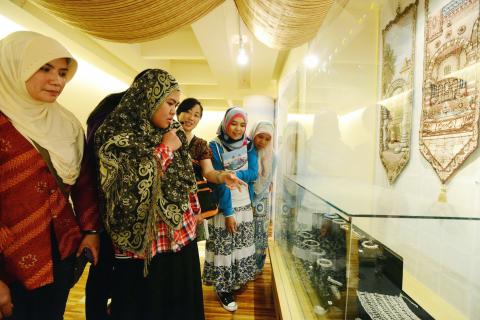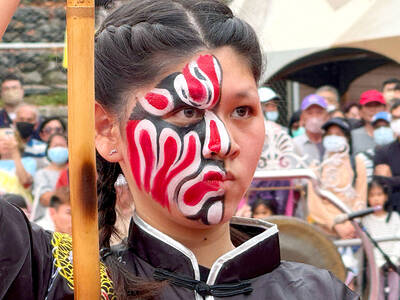Next Sunday, Taiwan’s oldest museum hopes to lure a more diverse crowd through its front door.
The National Taiwan Museum (NTM, 國立台灣博物館) is holding an “open museum day,” offering free admission for migrant workers and foreign spouses to all exhibits on Sunday, Sept. 14.
There’s the Exhibition of Islamic Life and Culture (伊斯蘭:文化與生活特展), which will be on view for its final day.

Photo Courtesy of National Taiwan Museum
By popular demand, Exhibition of Islamic Life and Culture has been extended from its original closing date of June 22 to next Sunday.
This special exhibition presents religious artifacts, manuscripts, musical instruments and other objects that survey Islamic civilization and daily life.
NTM, located at the 228 Peace Memorial Park in downtown Taipei, opened its doors in 1908. It is the only museum established during the Japanese colonial era that is still in operation at its original site.
On Sundays and holidays, the 228 Peace Memorial Park is full of migrant workers, new immigrants and foreign spouses meeting friends on their day off.
Workers seldom enter the museum for a visit, according to museum staff.
“I asked our staff to speak to them and to find out why. Most of them preferred to stay at a distance because they didn’t think the museum was for foreigners and blue-collar workers,” said NTM deputy director Lin Hwa-ching (林華慶).
Lin said NTM wants to connect with migrant workers and new immigrants, particularly to invite them into the Exhibition of Islamic Life and Culture.
“Quite a number of migrant workers and foreign spouses are from Indonesia and are Muslims. So this exhibit can promote multicultural dialogue and mutual exchange,” he said.
Lin said that the exhibit may also be able to help the children of international marriages explore the cultural traditions of their parent’s home country.
Next Sunday, visitors can also view NTM’s other exhibits: Mysterious Pescadores, about the biodiversity and marine geomorphology of southern Penghu County’s four islands; Taiwan Black Jade, about unique Taiwanese gems from the metamorphic rocks of the east coast; and an exhibition on the Hokutolite (北投石), a radium-containing rare mineral from Beitou’s hot springs which was discovered in 1905 by the renowned Japanese mineralogist Okamoto Yohachiro.

The People’s Republic of China (PRC) last week offered us a glimpse of the violence it plans against Taiwan, with two days of blockade drills conducted around the nation and live-fire exercises not far away in the East China Sea. The PRC said it had practiced hitting “simulated targets of key ports and energy facilities.” Taiwan confirmed on Thursday that PRC Coast Guard ships were directed by the its Eastern Theater Command, meaning that they are assumed to be military assets in a confrontation. Because of this, the number of assets available to the PRC navy is far, far bigger

The 1990s were a turbulent time for the Chinese Nationalist Party’s (KMT) patronage factions. For a look at how they formed, check out the March 2 “Deep Dives.” In the boom years of the 1980s and 1990s the factions amassed fortunes from corruption, access to the levers of local government and prime access to property. They also moved into industries like construction and the gravel business, devastating river ecosystems while the governments they controlled looked the other way. By this period, the factions had largely carved out geographical feifdoms in the local jurisdictions the national KMT restrained them to. For example,

The remains of this Japanese-era trail designed to protect the camphor industry make for a scenic day-hike, a fascinating overnight hike or a challenging multi-day adventure Maolin District (茂林) in Kaohsiung is well known for beautiful roadside scenery, waterfalls, the annual butterfly migration and indigenous culture. A lesser known but worthwhile destination here lies along the very top of the valley: the Liugui Security Path (六龜警備道). This relic of the Japanese era once isolated the Maolin valley from the outside world but now serves to draw tourists in. The path originally ran for about 50km, but not all of this trail is still easily walkable. The nicest section for a simple day hike is the heavily trafficked southern section above Maolin and Wanshan (萬山) villages. Remains of

Shunxian Temple (順賢宮) is luxurious. Massive, exquisitely ornamented, in pristine condition and yet varnished by the passing of time. General manager Huang Wen-jeng (黃文正) points to a ceiling in a little anteroom: a splendid painting of a tiger stares at us from above. Wherever you walk, his eyes seem riveted on you. “When you pray or when you tribute money, he is still there, looking at you,” he says. But the tiger isn’t threatening — indeed, it’s there to protect locals. Not that they may need it because Neimen District (內門) in Kaohsiung has a martial tradition dating back centuries. On